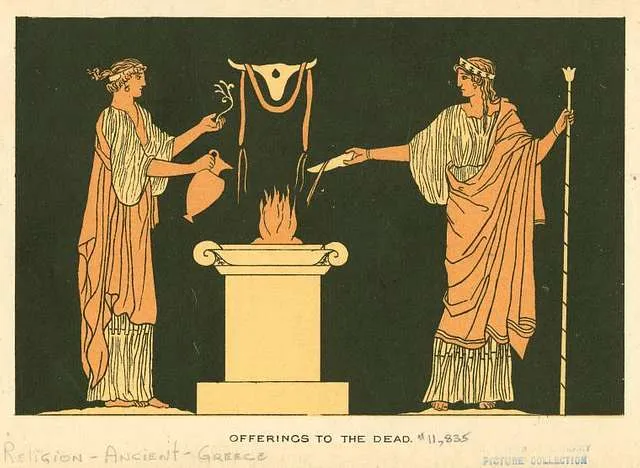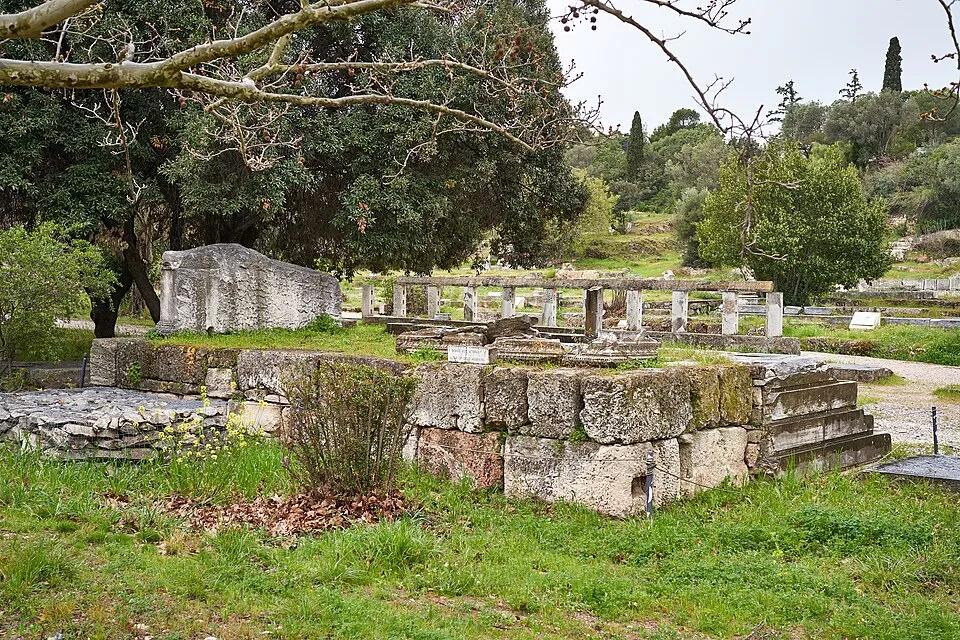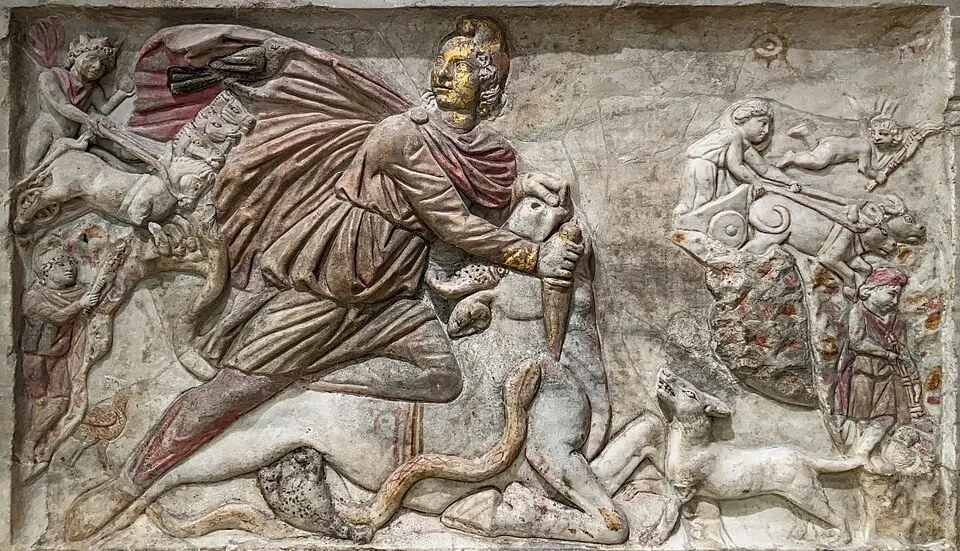Rethinking Religion in RPG Settings

Introduction
There is a blog bandwagon related to Clerics and their hierarchy and rituals going on as a result of the Pope dying. I don't normally participate in these things because I have enough blog posts on the backburner without adding more to my plate, but it just so happens that I have opinions on Religion in Tabletop RPGs, especially when it comes to the OSR Play Style.
Clerics have been a part of the hobby since the little brown books were published way back in 1974. They are weird. Christian crusaders with divine miracles straight out of the Old Testament mixed with Hammer Horror Van Helsing for good measure.
Originally conceived as a deterrent for a vampire PC that was threatening to destroy the balance of power in Dave Arneson's Blackmoor campaign, the priest/vampire hunter archetype was further complicated by a later addition of Polytheism that feels like it has more in common with how Americans support football teams than actual historical polytheistic practice.
There have been many efforts to fix some of the thematic issues with Clerics such as introducing an actual polytheistic Pantheon (Eberron), having various Clerical Orders dedicated to deified Imperial Saints (my friend and GM Gus L.), and using an actual stand-in for the Catholic Church and its various Saints (Gavin Norman's Dolmenwood).
I have no interest in taking this approach. For me, in my games, Clerics are cruft, a sacred cow to set aside in my search for a way to handle religion that feels, well, fantastical rather than like D&D. The thing is, I think a true polytheistic religious system has more potential for mystery and adventure.
A Deity For Every Occasion

In almost all D&D settings, Clerics pick one deity to devote themselves to while at the same time acknowledging the existence of other gods. These other gods have distinct purviews that make them better suited for interceding on some matters more than others, but despite this the Cleric will not pray or making offerings to any being they are not devoted to.
This is not how Divinities are typically treated in the ancient polytheistic religions, where all deities would potentially be on the table depending on what is being sought by the divine. Instead of only having one deity to worry about if you are a Cleric, or effectively no deity if you are any other type of character, I prefer a setting where all Divinities must be taken into consideration.
A Note on my influences: I am drawing heavily upon an impossibly large number of books, podcasts, and films I've consumed pertaining to Greek, Roman, and (to a lesser extent) Norse mythology, mystery cults, and of course the excellent series on Practical Polytheism written by Bret Devereaux. It is, you will note, a profoundly Western list of influences. While I do have an interest in Eastern polytheistic religions such as Shinto and Hinduism, I have a much more shallow understanding of these religions and so while I make speak in general terms about "polytheistic religions", please keep in mind that the Western origin of such religions is left implied.
Why do I think this is a better approach for Fantasy RPGs? Because religion is a pretty key aspect of any given culture and most characters can simply ignore it. In the ancient world, no one could get away with this. You had major festivals throughout the year dedicated to different deities, family shrines, famous religious sites that people felt compelled to visit, etc.
Here are some things that I think you can take from ancient polytheistic religions that will make your Fantasy RPG setting a more interesting place to adventure in.
Practical Uncertainty
One of the most interesting takeaways from the previously mentioned Practical Polytheism series is that "They are not about moral belief, but about practical knowledge." People didn't need to agree with the actions or moral code of a deity in order to pay them homage, they just had to either want something from said deity or want to avoid something bad happening to them that fell under that deity's purview.
Their belief in the deity was a logical consequence of them perceiving either the success or failure of their efforts to appease the divinity in question.
In a normal D&D setting, we instead ignore deities that we dislike. Hell, we may even decide to eventually fight them! However, they are generally only relevant if we encounter a Cleric of their faith who is working at cross purposes to the party.
What if you can't tell the nature of a deity, though? There are a lot of old Sword and Sorcery (or Sword and Planet!) stories that involve priests that are actually sorcerers, or in service to a demon, or charlatans who have fabricated a whole religion for nefarious ends. These sorts of plot twists are often foiled before they even begin in a world where, with the right magic, determining someone's Alignment is as easy as it is for people in modern times to determine blood type. If nothing else, the very presence or lack thereof of Divine magic is an easy indicator of whether they are legitimate.
Your standard Cleric or Magic-User has a host of ways for gaining certainty about such things. Divine magic is a known quality within the world. Detect Evil can quickly determine whether a priest is legitimate because they are tied to the particular Alignment of their deity. People are certain about their afterlife, certain about the servants and associations about their divinity. This certainty is boring.
What I am proposing instead is making people in your settings be uncertain about the provenance of the miracles in their lives and thus be practical about their worship. Maybe they have good reasons for paying homage to a "bad" deity, maybe they have bad reasons for paying homage to a "good" one. They will not necessarily know the source of any blessings or curses that they receive, and that is okay. Leave such mysteries for your players to solve.
Pantheons and Religious Epithets

What is left of the altar dedicated to Zeus Agoraios, an epithet of Zeus you might make an offering to if you wished to find success in the marketplace. Photo by George E. Koronaios taken from Wikimedia Commons.
A good polytheistic religion generally has a pantheon of related deities, each often having a variety of purviews. Some of the things they are responsible for are so disparate as to be nonsensical, which can be fun but also makes it very difficult to remember. The Greek Gods and Goddesses solved this issue by having epithets that distinguished certain aspects of their identity that you were addressing. For instance, one might invoke Zeus as "Zeus Agoraeus" if one wanted his favor within the marketplace, but it would be more appropriate to invoke "Zeus Horkious" (the keeper of oaths) if one wished to swear an oath or punish an oathbreaker.
A good way to apply this to your own games is to have fewer deities with more purviews and allow the use of epithets to slowly introduce more and more information about them as it is relevant. For instance, I have two principal deities in my home setting, Sol and Lūn. They have a variety of purviews, some positive and some negative, and I help my players keep them separate by breaking their purviews up and assigning them to Epithets. For instance, Lūn Full-Moon holds dominion over hunting and is patron to those touched by sudden inspiration (and lunacy), while Lūn New-Moon is associated with monsters.
Localism and Religious Syncretism
The interesting thing about the Epithets of divinities is that many of them clearly demonstrate that they are a version of the deity that was born of local traditions and values. Often times, in Fantasy RPGs it seems that deities are treated as a universally understood phenomenon, but in fact throughout history the "same" entity might have many different types of religious rituals and beliefs associated with them depending on where the religious activity is taking place.
Sometimes this is due to a certain event supposedly having happened at that location, but often times it is because that divinity actually started out as a separate identity and was absorbed into the larger religious tradition of a region through Religious Syncretism, the process by which two religious traditions are blended. The Romans are, of course, notorious for having done this with the Greek deities in order to incorporate their myths into their own belief system, but interestingly they would also just identify deities that they felt like had powerful purviews that were missing from their own pantheon and just build them temples so they could start a divine relationship with them.
This is very applicable to your average RPG setting because it means you don't have to worry about each member of your pantheon having full representation of all of their aspects in a given place. The specific divine epithets present in the region of Amberweald from my home game are different than those in the region of the Violent Expanse, despite the fact that the dominant ethnic group in each region is the same. Joseph Minola talks about the concept of localism which I think is a good way to approach it: Each region can have its own peculiarities with unique flora and fauna, religious traditions, and people that are distinct and yet connected to the larger whole.
It also means that you can be part of a religious tradition and still have things to discover about it. How do the Rituals of the particular divine epithets of a given region work compared to the ones your characters are used to? Perhaps there is a shrine to a particularly obscure epithet that is lost in the wilderness, waiting to be rediscovered with unique Relics and Rituals associated with it that could be recovered. Perhaps an ancient deity whose faithful are long-dead is waiting to be found and incorporated into the existing pantheon: If they are in charge of a powerful purview, why wouldn't your players want to have that power at their disposal or prevent it from being used against them?
Festivals
I don't have much to say here besides the fact that religious festivals are a pretty universal component of religious practice and they are terribly underutilized in RPG settings. I mean, sure, they are often mentioned in setting materials but they don't really encourage interaction.
Religious festivals should be a time where lots of people visit a given settlement. There should be more things to buy, more people to meet, and unique opportunities to be taken advantage of (like taking part in religious rituals!). People who run old school games really like a good carousing table, and festivals are a good opportunity to have some with very unique results.
Mystery Cults

Less skulking around with weird daggers and more getting drunk and learning mysteries of the universe in allegorical form that all revolve around this guy stabbing a bull to death for reasons that are too complicated to go into here.
Cults in RPGs normally have a bad reputation, being the primary occupation for folks who skulk around in black robes with exotic curvy daggers ready to attempt nefarious deeds for no practical benefit so that PCs can feel justified in slaughtering them. However, in reality there was a particular type of cult in ancient times that was a much more elite affair that I think we should see more of in RPG settings: the Mystery Cult.
Mystery cults were often devoted to existing deities but claimed to have secret rites that one could be initiated into that were different and more potent than the rituals performed by the public-facing religion of the larger temples. Sometimes these initiation ceremonies happened at the same time as a larger religious festival that the general public took part in.
Applying this to your RPG setting, that means that during Downtime some PCs can carouse during the larger festival while others might uncover and begin initiation into the mysteries of a particular deity or deities. Religious festivals then become not just set dressing, but a valuable opportunity for PCs and a great way for GMs to demonstrate setting lore in a way that is both useful and actionable for players.
But What Do I Do About Clerics?
I recognize that what I am proposing here is probably most useful for classless systems where there isn't a class specifically devoted to divine magic. Even in a class-based system, I would be in favor of dismantling the Cleric entirely and preserving only its most essential aspects through equipment and the diegetic acquisition of rituals and relics.
You don't have to go that far, though. Just stop treating the Cleric as a divinely chosen champion of a particular god and start treating them like a scholar that specializes in the practical application of religious ritual. Let them interact with the whole of the pantheon as needed, even the gods they find distasteful, because isn't that more fun? Let them visit forgotten shrines and gain new insights and abilities. Let them uncover lost deities and bring them back to the light of day, or uncover false epithets of existing ones and cast them down.
Let them be conduits of the divinities. All of them.
Conclusion
Whether you seek to save Clerics from their nonsensical beginnings or wish to abandon them and figure out other ways for your players to interact with the divine in your setting, I hope you will consider that rather than making D&D religion more Catholic you could just go the other direction. Make the divine, and the divinities that make up it, just one more part of the mysteries of your setting that your players can explore and interact with.
Just make sure they understand that bringing an actual goat to sacrifice during game night won't make you ignore that bad roll they just made.